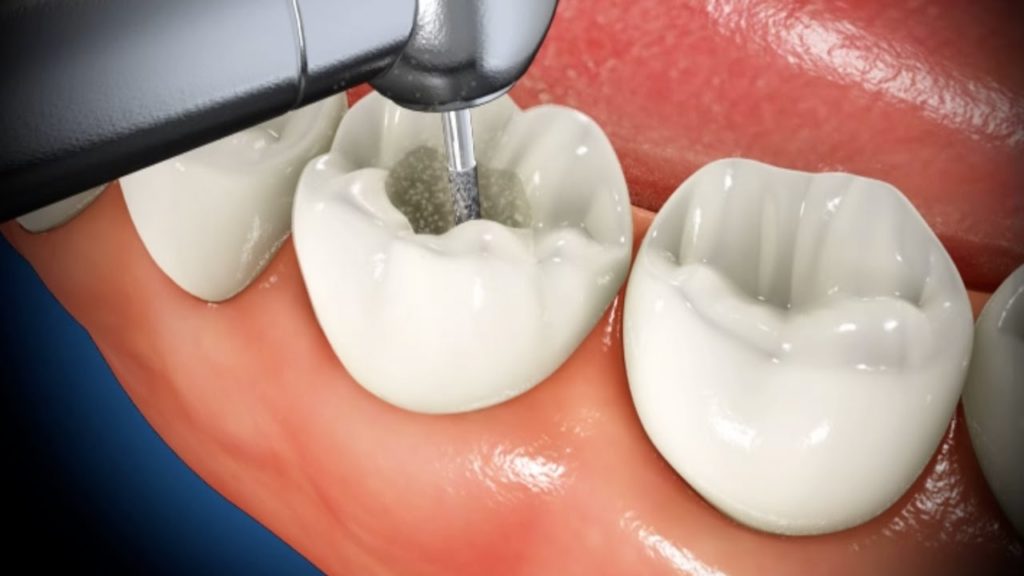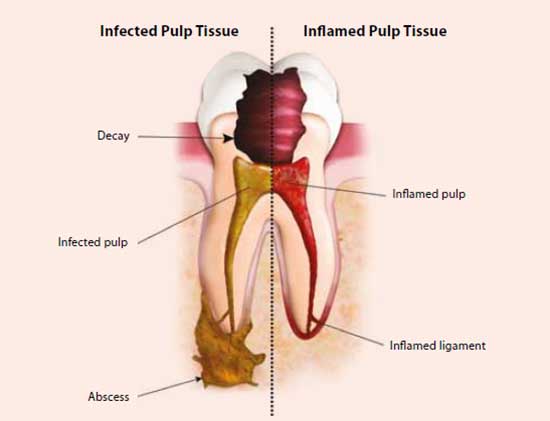Root Canal Therapy in Regina SK
Root Canal Therapy Can Save Your Tooth
Root canal therapy (RCT) and endodontics are the terms that describe the procedure that treats the nerve of the tooth. Endodontics is a specialty of dentistry that deals specifically with the tooth pulp (the substance in the center of a tooth that consists of nerve, blood vessels & connective tissue) and tissues surrounding the root of the tooth.
Root canal therapy can save the root and crown of the tooth in order to maintain its proper spacing and function in the mouth. Root canal therapy is the removal of the nerve and blood vessels from the canals within the tooth, and replacing them with a biocompatible sealer and rubber material called gutta percha. Although the tooth is no longer viable (alive), it still functions in the mastication (chewing) of food just like an alive (viable) tooth.
Root canaled teeth will likely need a dental crown to protect the tooth from fracturing in the future. The full coverage crown can consist of either a full metal crown, partial metal or all-ceramic (no metal) crown.
Treatment is needed for infected or inflamed pulp
The pulp is soft tissue inside the tooth that contains blood vessels and nerves. When the pulp becomes infected or inflamed, treatment is needed.
Pulp infection and inflammation most often occur if you have:
- a cracked or chipped tooth
- a deep cavity or filling
- other serious injury to the tooth
All of these can allow bacteria to enter the pulp and cause infection and/or inflammation.
WE'D LOVE TO MEET YOU!
New patients are always welcome! Let's discuss your dental health together.
Southland Dental Clinic of Regina
101D – 2965 Gordon Rd. Regina, SK S4S 6H7
Monday: 7:30am-5pm
Tuesday: 7:30am-5pm
Wednesday: 7:30am-4pm
Thursday: 7:30am-5pm
Friday: 8:30am-4pm
(306) 751-2000

Problems from infected or inflamed pulp
The infection or inflammation in the pulp can spread to the tissues around the root of the tooth. This can cause pain and swelling, but even if there is no pain, bacteria from the infection can damage the bone that holds the tooth in you jaw.
Without a root canal, the infection and damage will continue and your tooth most likely will need to be removed.
Problems from infected or inflamed pulp
When a tooth is removed and not replaced, the teeth around it may shift. This can make it hard to bite, chew and clean your teeth. Areas in your mouth that are not cleaned well are more likely to have problems like decay or gum disease.
Root canal therapy can prevent these problems by saving your natural tooth. Also, root canal therapy is usually less expensive than a replacement tooth.
General steps of root canal therapy
Root canal therapy may involve one or more dental visits. Your dentist or endodontist will perform the necessary steps to save your tooth:
- Your tooth is numbed for your comfort. A thin, flexible sheet of latex or non-latex material called a rubber dam is placed over your tooth to keep it dry. An opening is made through the crown of the tooth into the pulp chamber.
- Your tooth’s nerve or pulp is removed from the pulp chamber and the canal of each root of the tooth. Each root canal is cleaned, shaped and disinfected so that it can be filled.
- Your dentist may place medicine in the pulp chamber and root canal(s) to help treat the infection.
- The treated root canals are filled with a rubber-like material to seal them.
- A temporary filling is placed in your tooth to prevent infection of the root canals. You may be given antibiotics if the infection has spread beyond the end of the root(s).
- Finally, your dentist removes the temporary filling and restores the tooth with a crown or a permanent filling to strengthen it and improve the way it looks. If an endodontist performs the procedure, they usually recommend that you return to your general dentist for this step.
It is very important to follow instructions from your dental team and to attend all of your follow-up appointments.
Root Canal Success Rates
Root canals have a good success rate of approximately 85-90%. This can be compared with implants which now have a 92-97% success rate. Many teeth fixed with root canal therapy can last a lifetime when done properly. Be sure to evaluate your dentist before opting for the procedure.
Experienced in Root Canal Therapy
Our doctors have had many years experience in treating patients with root canal therapy and have had tremendous success rates with this procedure. Our doctors would be happy to discuss your options and what would fit best for your situation.
The Painful Myth
The practice of root canal therapy or treatment is not to cause pain, but to relieve it. The perception of root canals being painful began decades ago. With new technologies and anesthetics, treatments today have been compared to that of a filling or crown. Most patients who visit a dentist or endodontist do so because they are seeking relief from a toothache. Root canals are designed to alleviate this toothache!
WE'D LOVE TO MEET YOU!
New patients are always welcome! Let's discuss your dental health together.

Frequently Asked Questions:
Local anaesthesia (freezing) makes treatment painless. While there may be some discomfort for a brief period after treatment, this can be controlled with aspirin strength medications.
It will be necessary for you to see your dentist to have a permanent filling placed or a cap (crown) made for the tooth. Your dentist will assist you in choosing the most suitable kind of restoration.
Unfortunately, when a tooth is infected, the blood supply (pulp) running through the tooth is affected as well. As a result, there is no way to conduct the antibiotics to the needed area. They do however, assist in controlling and eliminating infection in the surrounding bone before and after root canal therapy. Will my tooth last forever after treatment?
Root canal therapy has been reported to be up to 95% successful. Many factors influence the treatment outcome: the patient’s general health, bone support around the tooth, strength of the tooth including possible fracture lines, shape and condition of the root and nerve canal(s) and continued follow-up care with your general dentist. Although we cannot guarantee the successful outcome of root canal procedures, you can be assured that the most advanced techniques and treatments modalities will be performed to ensure the best prognosis possible.
Insect bites, burns, scrapes and cuts; all of these will produce inflammation of the skin characterized by redness (an increase in the blood flow to the area) and therefore swelling. Removal of pulp tissue from a root canal can produce an inflammation in the socket holding the tooth. Unlike our skin which can expand, increased fluid in bone produces pressure on sensitive structures like the membranes of our sinuses or large nerve structures in our jaw. All inflammation takes 7 to 10 days to disappear (think how long a cold lasts). The medications you are given will help to minimize any discomfort from the inflammation resulting from your condition and the treatment rendered, however, if you are unsure, please feel free to contact our office so that we may check the progress of your healing.
Table of Contents

